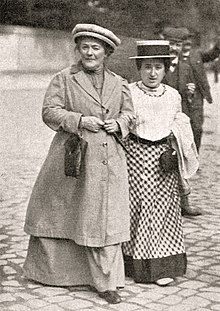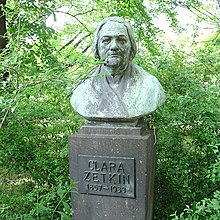Clara Zetkin


Clara Zetkin (née Eißner; 5 July 1857 – 20 June 1933) was a German Marxist theorist, activist, and fighter for women's rights. In 1910, she organized the first International Women's Day.[1]
Until 1917, she was active in the Social Democratic Party of Germany, then she joined the Independent Social Democratic Party of Germany (USPD) and its far-left wing, the Spartacist League; this later became the Communist Party of Germany (KPD), which she represented in the Reichstag during the Weimar Republic from 1920 to 1933.
Contents[hide] |
[edit] Life and work
Zetkin was born Clara Eissner in Wiederau, a peasant village in Saxony, now part of the municipality Königshain-Wiederau.[2] Her father, Gottfried Eissner, was a schoolmaster and church organist who was a devout Protestant, while her mother, Josephine Vitale Eissner, came from a bourgeois family from Leipzig and was highly educated.[2][3][4] Having studied to become a teacher, Zetkin developed connections with the women's movement and the labour movement in Germany from 1874. In 1878 she joined the Socialist Workers' Party (Sozialistische Arbeiterpartei, SAP). This party had been founded in 1875 by merging two previous parties: the ADAV formed by Ferdinand Lassalle and the SDAP of August Bebel and Wilhelm Liebknecht. In 1890 its name was changed to its modern version Social Democratic Party of Germany (SPD).
Because of the ban placed on socialist activity in Germany by Bismarck in 1878, Zetkin left for Zurich in 1882 then went into exile in Paris. During her time in Paris she played an important role in the foundation of the Socialist International socialist group. She also adopted the name of her lover, the Russian revolutionary Ossip Zetkin, with whom she had two sons, Kostja and Maxim. Ossip Zetkin died in 1889. Later, Zetkin was married to the artist Georg Friedrich Zundel, eighteen years her junior, from 1899 to 1928.

In the SPD, Zetkin, along with Rosa Luxemburg, her close friend and confidante, was one of the main figures of the far-left revolutionary wing of the party. In the debate on Revisionism at the turn of the 20th century she, along with Luxemburg, attacked the reformist theses of Eduard Bernstein.
Zetkin was very interested in women's politics, including the fight for equal opportunities and women's suffrage. She developed the social-democratic women's movement in Germany; from 1891 to 1917 she edited the SPD women's newspaper Die Gleichheit (Equality). In 1907 she became the leader of the newly founded "Women's Office" at the SPD. She started up the first "International Women's Day" on 8 March 1911, launching the idea of it in Copenhagen, in what later became the Ungdomshuset.
During the First World War Zetkin, along with Karl Liebknecht, Rosa Luxemburg and other influential SPD politicians, rejected the party's policy of Burgfrieden (a truce with the government, promising to refrain from any strikes during the war). Among other anti-war activities, Zetkin organised an international socialist women's anti-war conference in Berlin in 1915. Because of her anti-war opinions, she was arrested several times during the war.
In 1916 Zetkin was one of the co-founders of the Spartacist League and the Independent Social Democratic Party of Germany (USPD) which had split off in 1917 from its mother party, the SPD, in protest at its pro-war stance. In January 1919, after the German Revolution in November of the previous year, the KPD (Communist Party of Germany) was founded; Zetkin also joined this and represented the party from 1920 to 1933 in the Reichstag. She interviewed Lenin on "The Women's Question" in 1920.[5]

Until 1924 Zetkin was a member of the KPD's central office; from 1927 to 1929 she was a member of the party's central committee. She was also a member of the executive committee of the Communist International (Comintern) from 1921 to 1933. In 1925 she was elected president of the German left-wing solidarity organisation Rote Hilfe. In August 1932, as the chairwoman of the Reichstag by seniority, she called for people to fight National Socialism.
When Adolf Hitler and his National Socialist German Workers Party took over power, the Communist Party of Germany was banned from the Reichstag, following the Reichstag fire in 1933. Zetkin went into exile for the last time, this time to the Soviet Union. She died there, at Arkhangelskoye, near Moscow, in 1933, aged nearly 76. She was buried by the wall of the Kremlin in Moscow.
[edit] Posthumous honors
- Zetkin was memorialized on the ten mark banknote of the now-defunct German Democratic Republic (GDR) (East Germany).
- In 1954, the GDR established the Clara Zetkin Medal (Clara-Zetkin-Medaille) to honor women particularly active for women's rights.
[edit] See also
[edit] Further reading
- Clara Zetkin: Selected Writing, Clara Zetkin, 1991 ISBN 0-7178-0611-1
- Clara Zetkin as a Socialist Speaker Dorothea Reetz, 1987 ISBN 0-7178-0649-9
[edit] References
- ^ A woman's place is in the revolution
- ^ a b Young, James D. (1988). Socialism since 1889: a biographical history. Rowman & Littlefield. pp. 169. ISBN 0389208132.
- ^ Encyclopedia of World Biography: Vitoria-Zworykin. Gale Research. 1998. pp. 504. ISBN 0787625566.
- ^ Zetkin, Klara; Philip Sheldon Foner (1984). Clara Zetkin, selected writings. International Publishers. pp. 17. ISBN 0717806200.
- ^ The interview transcript (in English) is available at The Emancipation of Women: From the Writings of V.I. Lenin, interview with Clara Zetkin, International Publishers, on the Marxist Archives
[edit] External links
- Clara Zetkin at Spartacus Educational (biography, extracts)
- Zetkin at marxists.org (biography, some writings, links)
蔡特金出生于德国萨克森地区一个教师家庭,她自幼喜欢读书,尤其爱读父亲珍藏的两本叙述瑞士和法国革命的禁书。在童年时代,蔡特金已经懂得“一个人必须准备为自己的信仰牺牲生命”。
1878年,21岁的蔡特金在莱比锡女子师范读书时,爱上了比她大10岁的奥西普·蔡特金。奥西普·蔡特金是流亡德国的俄国革命者,经常向在德国的俄国留学生传播共产主义思想。1880年,“铁血宰相”俾斯麦颁布“镇压社会主义法”后,奥西普被德国当局驱逐出境,被迫流亡巴黎。
3年后,蔡特金在巴黎的一间简陋小屋里,找到了日夜思念的奥西普。两人悄悄地结了婚。婚后,蔡特金夫妇过着拮据的生活,但他们仍在极度艰难的条件下坚持着革命事业。在1885年悼念巴黎公社的游行中,蔡特金甚至被警察的马刀砍倒昏了过去。困苦的日子又过了3年,奥西普因患恶性脊髓病而导致全身瘫痪,医治数月无效与世长辞,那时的蔡特金只有32岁。从此之后,蔡特金终身未嫁。这位为全世界妇女幸福奋斗一生的女性,只享受了短短7年的家庭生活。
1889年,在第二国际的成立大会上,蔡特金发表了著名的演说:《为了妇女的解放》,并当选为第二国际的书记之一。作为第二国际和第三国际的领导人,蔡特金是恩格斯与列宁的亲密战友,她经常同列宁探讨包括性爱在内的各种问题,当然,他们一致批评性解放。
为了宣传妇女解放,1891年蔡特金创办了指导欧洲妇女运动的《平等报》,她承担了所有的编辑工作。《平等报》成了妇女们的良师益友,因为那上面写到了她们的生活,反映了她们的痛苦,更替她们喊出了愤怒的呼声。蔡特金成功地使《平等报》成为国际妇女运动最锋利的武器。
1908年3月8日,美国纽约15000名纺织业女工走上街头,他们高喊着“我们要面包加玫瑰”的口号,要求改善工作条件、争取投票权、制止童工……蔡特金迅即在杂志上作了此次“三八”游行的详细报道,并预言真正的妇女解放斗争会因它而打响。
1910年8月,在丹麦哥本哈根,身为国际妇女联合会书记处书记的蔡特金主持召开了第二次国际妇女代表大会。她向大会倡议:为纪念1908年纽约纺织女工的示威游行,将3月8日定为国际劳动妇女节。倡议得到与会者一致同意,从这一天起,“三八节”成为全世界妇女共同的节日。
蔡特金为全世界妇女的解放而不遗余力,1933年6月20日,她在莫斯科病逝,终年76岁。斯大林亲自为她扶柩送葬,她被安葬在红场,是长眠在那里为数不多的几位女性之一。